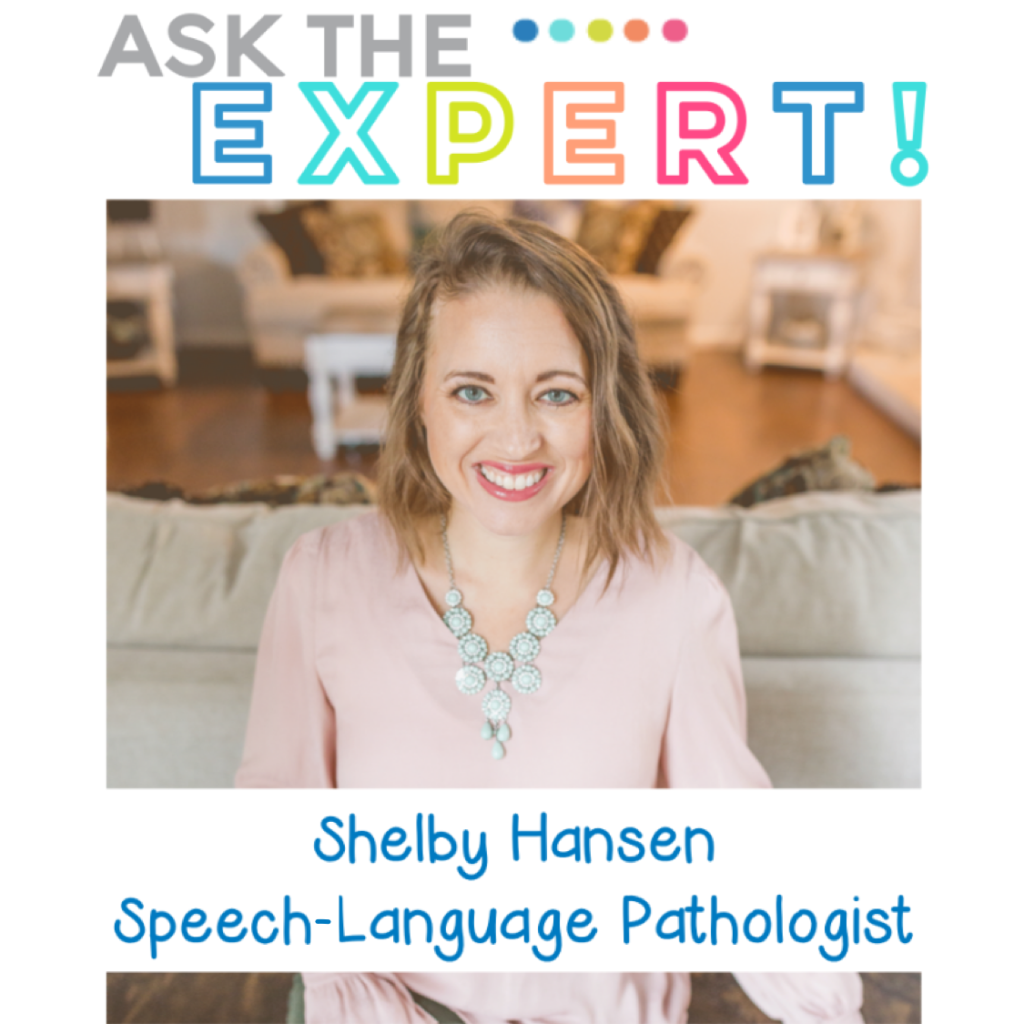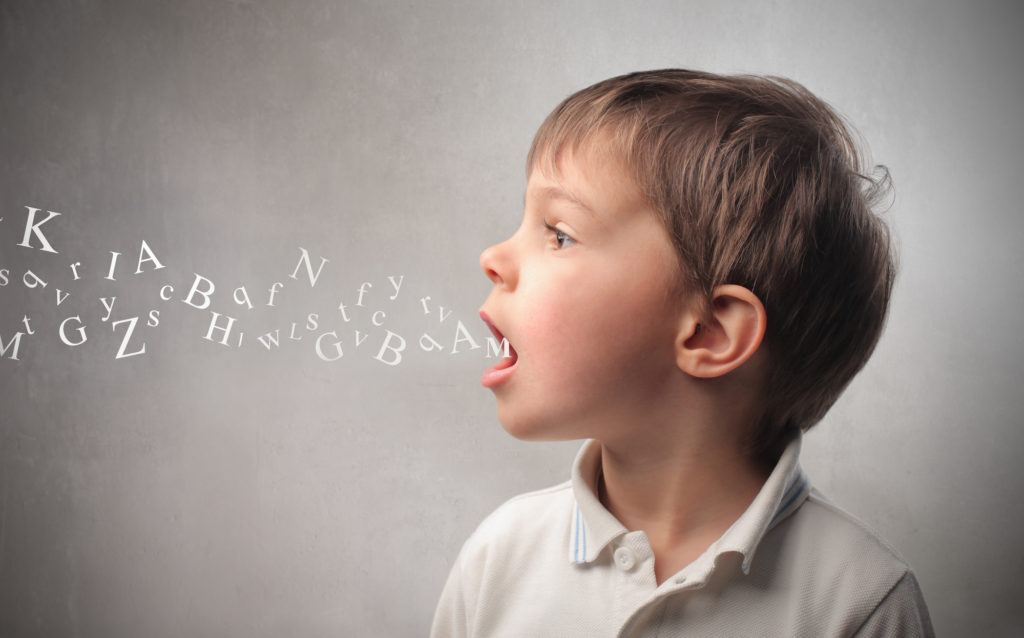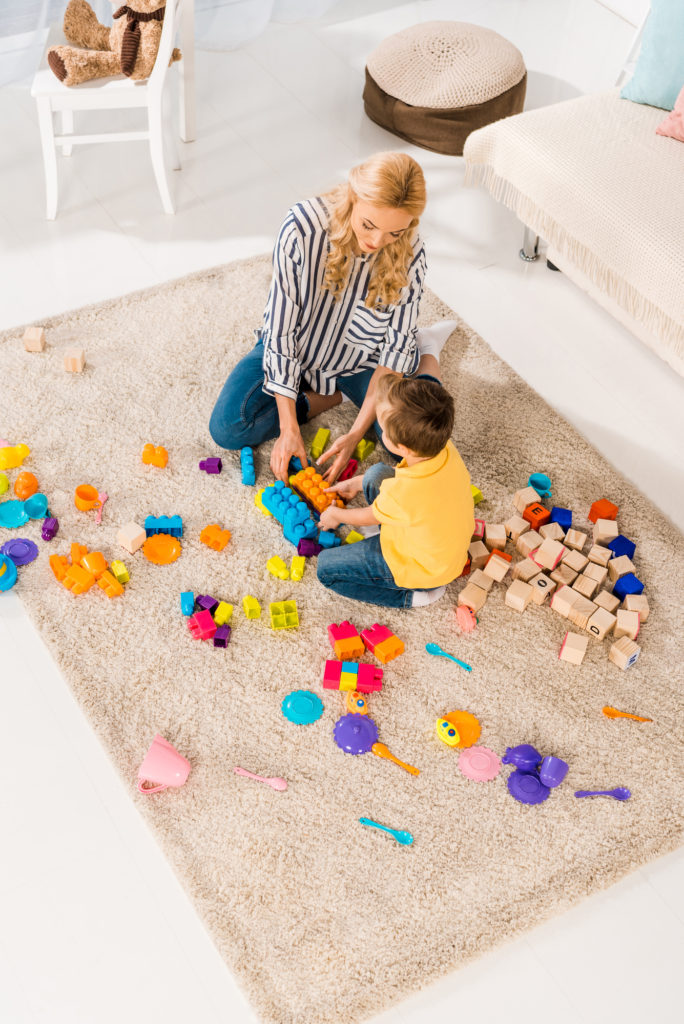This post may contain affiliate links.
One thing I am rolling out this year is an Ask the Expert blog series! As a mom and a teacher, it can sometimes feel like you need to know it all. It’s overwhelming; but the truth is that there are so many amazing people out there who can help answer your questions about the changing needs of your child. Each week I will be featuring an expert that relates to life with children. I will also be giving you a chance to anonymously ask your questions to each expert! Watch for my IG stories each week announcing the expert and to submit your questions! This week’s expert is, Shelby Hansen. Shelby is a nationally board and state certified speech-language pathologist.

Before we jump into the questions, here is a little bit about Shelby:
Shelby grew up in a military family, moving all over the United States! In college she studied communication disorders and received both her bachelors and masters degree from Brigham Young University. Shelby is married to her college sweetheart, who is in the Air Force! She is a mom of four children, ages 12, 10, 7 and 3. Since getting married, they have lived in 7 states as well as Japan! Can you even imagine? In July 2018, Shelby received a life saving kidney transplant from an unknown donor. Wow! Just typing that gives me chills. She now lives with her family in Ann Arbor, Michigan, where she is currently working as an SLP at a K-8 charter school, after being a stay-at-home mom for the last 10 years.
Let’s jump right in! What is a speech-language pathologist?
A speech-language pathologist (SLP) is a professional that has specialized training in evaluating and treating language, speech, and swallowing disorders. This includes a lot of training! An licensed SLP must have a bachelors, masters, and clinical fellowship year. Once an SLP has finished their fellowship, they can apply to the American Speech and Hearing Association for full licensure.
Who and how can a speech-language pathologist help?
SLPs help anyone from infants-99+! Tiny infants may be treated for swallowing disorders, while seniors may be treated for language deficits after having a stroke. Most people are familiar with SLPs helping kids who “can’t say their r’s” or who aren’t talking like other kids their age. SLPs help by examining what a person needs and developing a treatment plan to help them overcome their communication challenges. Many SLPs give services directly to the child, while others provide more family-based interventions and include parents in the treatment sessions.

What speech milestones should parents or teachers of little ones be looking for?
Many parents ask me when to worry about their child’s language. ASHA (the American Speech and Hearing Association) has put out a great resource for communication red flags to be mindful of. If your child is not doing these following things by the age listed, it’s a great idea to seek the advice of an SLP to see if your child could benefit from speech/language services.
Language:
- Birth–3 months: Not smiling or playing with others
- 4–7 months: Not babbling
- 7–12 months: Making only a few sounds. Not using gestures, like waving or pointing
- 7 months–2 years: Not understanding what others say12–18 months: Saying only a few words
- 1–2 years: Not putting two words together2 years: Saying fewer than 50 words
- 2–3 years: Having trouble playing and talking with other children
- 4–5 years: Having problems with early reading and writing
Speech:
- 1–2 years: Not saying p, b, m, h, and w the right way in words most of the time
- 2–3 years: Not saying k, g, f, t, d, and n the right way in words most of the time, being hard to understand, even to people who know the child well
Stuttering:
- 2–3 years: Having a lot of trouble saying sounds or words. Repeating the first sounds of words, like “b-b-b-ball” for “ball”. Pausing a lot while talking. Stretching sounds out, like “fffffarm” for “farm”.
Hearing Loss
- Birth–1 year: Not paying attention to sounds
- 7 months–1 year: Not responding when you call his/her name
- 1–2 years: Not following simple directions
- Birth–3 years: Having speech and language delays
What should parents do if they have concerns with their child’s speech?
The first thing to do is to contact a speech-language pathologist. We’re finding that often pediatricians take a wait-and-see approach, which can be very harmful if your child does have communication disorder. The earlier your child can have services, the better. Children can receive free speech and language services from their local school districts. Most states have an early intervention program run through the state that are also free of charge.
What games and activities can be done at home to help with language development?

Here are three simple ways to help your child’s language to develop:
Become the narrator.
Talk about everything with your child! Narrate what is happening, what you’re planning to do, what you are doing. When you speak, you are giving them the words to speak too!
Have story time.
Book reading is important because it creates joint attention-meaning that you are paying attention to the same activity as your child. It creates a natural context for language to emerge. Pay attention to what your child is pointing at and give them words for what they are interested in.
Practice taking turns.
Children learn through conversation, so they need you to teach them how to take turns speaking. You can practice this by rolling a ball back and forth between you and your child. As you practice taking turns, pair your turn with a word that your child can focus on like “ball” or “catch”. This creates a really fun activity for your child to want to learn the new word.
What resources are available to help?
There are many ways to find help from a speech-language pathologist. I recommend going through the school district or state early intervention. You can also ask for a referral from your pediatrician. ASHA has an SLP finder tool to help you find a local SLP. You can go through your health insurance or seek out a private pay clinic. If you live close to a university, they often have speech therapy clinics. You can also check local FB mommy groups or poll your peers on social media for good SLPs in your area.
On top of finding a good, local SLP, I have an upcoming ebook “The Speech Therapy Guide: Conquering Guilt, Shame, and Stress to Support Your Child with Confidence” that is available for pre-order. In my book, we take a deep dive into all the things that are holding you back from taking the steps to get your child into speech therapy. This can be a very stressful time in parents’ lives and I walk you through simple, easy to follow steps to empower you to become your child’s best advocate. I’m passionate about helping you and your child succeed in speech therapy!

Reader Questions
Each week in my IG stories, readers will have a chance to submit their questions to be answered by the expert! Here are the chosen reader questions for this week!
My 3.5 year old stammers at the beginning of his sentences, how long
is this “normal”?
Some stuttering is typical of speech development. There are many theories about why this happens, but no one really knows exactly why. Some stuttering is developmental and kids outgrow it. Other times, a child will benefit from speech therapy. There is a lot you can do to help your child if they are stuttering, and it’s beginning to be a problem. One of the worst things, is to tell your child to slow down. It can frustrate them and end up making the stuttering even more challenging than it already is. Rather, slow your own rate of speech and deliberately say one word at a time. Children learn from following your lead, so they’ll begin to match your rate. Another important thing to do is take down the stressful demands on your child when they are in the middle of stuttering. Don’t draw attention to the stutter and let them finish their thought without interrupting. A quick couple deep breaths to yourself can help calm you, which will in turn, help decrease the stress on your child. If you find that your child is
persisting in their stuttering, past 6-12 months, has a family history of stuttering, are a boy (more common than girls), and are having a negative outlook on speaking because of their stutter, please seek the advice of a licensed speech-language pathologist.
What age should I start thinking about taking the pacifier away?
I know this is a hard one! Three out of my four kids LOVED their pacifiers. The general guidelines that I use are to start reducing the time your child has their pacifier (or eliminate it all together) by 12-18 months. However, if that is simply not possible, make sure to limit pacifier usage to bed time only. Your child is learning new words every day, and if they have an obstacle in their mouth to talk around for most of the day, it’s hard for you to understand and to reinforce the new words they are learning. Also, prolonged pacifier usage can affect dentition, so this is another consideration. You really have to do what’s best for your family situation, so it is a matter of weighing the pros and cons for your family. One research study did find that children who used a pacifier or sucked their fingers for 3 years or more were three times more likely to develop a speech disorder. And don’t tell anyone, but I truly didn’t think that my 2-year-old could nap without his pacifier until he started daycare. They didn’t give it to him at nap, and he magically didn’t need it anymore. So sometimes as moms, we rely on things more than we need to. I know I have!
I’ve heard that sippy cups lead to speech delays? Is this true? What cups
do you recommend?
Yes, sippy cups are not great for kids’ speech development. When a child is swallowing with a valve in their mouth from a sippy cup, it affects how the muscles in their mouth develop and are strengthened. When you swallow from a cup that promotes a more natural swallow, it allows those muscles to mature, which helps your child articulate their sounds correctly. I personally, love the 360° cups, because they
are non-spill (such a lifesaver for moms!) and allow your child to have a more natural swallow. Sippy cups with flexible straws are also good to help develop a proper swallow. I recommend this cup, this cup and this one!
Want more from Shelby?
I know y’all enjoyed this interview as much as I did! Shelby is a wealth of knowledge and I love that she is a mom too! You can find her on her website, Facebook page, or Instagram, where she shares helpful language tips every day.
